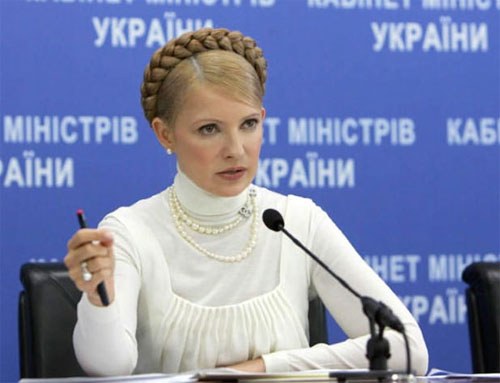Ukrainian ex-premier Yulia Tymoshenko on Wednesday ended a hunger strike, which started on April 20 to protest her treatment in prison, and began receiving treatment from her personal doctor, dpa reported.
German neurologist Lutz Harms of the Charite clinic in Berlin told reporters in the east Ukrainian city Kharkiv, where Tymoshenko is incarcerated, that she will begin drinking juice immediately and be allowed to take solid food later, in order to "bring her back from a starvation state."
Tymoshenko was transferred to a Kharkiv state hospital, 410 kilometres east of the capital Kiev, on Wednesday morning to receive treatment for back problems and the effects of a hunger strike. She is unable to stand unaided and suffers from low blood pressure and fainting spells, her lawyers have said.
Tymoshenko on Tuesday threatened to continue her hunger strike, and to refuse medical treatment, if Ukrainian government doctors attempted to touch her.
A Kiev court in October sentenced Tymoshenko to seven years in prison on abuse of power charges stemming from a natural gas import agreement that Ukraine signed with Russia while she was in office.
Tymoshenko, one of the leaders of the 2004 pro-democracy Orange Revolution, went on hunger strike to protest alleged abuse in prison. She has denied allegations of wrongdoing and said she believes herself to be the victim of government campaign to eliminate critics.
Tymoshenko's conviction and detention conditions have been widely criticized by European governments. Ukraine's government on Tuesday was forced to cancel an upcoming conference for Central and East European leaders scheduled in the resort port city of Yalta, because the leaders of close to a dozen attending nations cancelled their planned attendance.
Some cited Tymoshenko's alleged treatment in prison as the reason, drawing complaints from Ukraine's Foreign Ministry that European officials' "boycott" of Ukraine was counter-productive, and would undermine an upcoming Euro 2012 football championship of which Ukraine is a co-host.
Polish President Bronislaw Komorowski on Wednesday said political differences over Tymoshenko's status should not be allowed to harm sport.
"The point is that a political battle (should) not spoil our mutual Polish-Ukrainian sports feast and the endeavours that ... should be helpful on Ukraine's road to European integration," Komoworski said.
Poland is a staunch supporter of Ukrainian democracy and greater integration by Kiev with the European Union, although Ukraine's pro-Russia government has in recent years shown limited enthusiasm for the idea.
Komorowski appealed for Ukraine to scrap its laws that allow giving jail sentences for political decisions. Those laws, which enabled Tymoshenko's imprisonment, were "outdated" and a product of the "old (Communist) epoch and source of bad ... decisions," Komorowski said.
Several European leaders, among them EU President Herman Van Rompuy and European Commission President Jose Manuel Barroso, have said they are unlikely to attend any of the Euro 2012 games in Ukraine.






